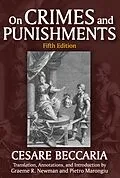Beccarria's influential Treatise On Crimes and Punishments is considered a foundation work in the modern field of criminology
Inhalt
Introduction to the Treatise, A Note on the Text, Biographical Note, On Crimes and Punishments, To the Reader, Introduction, I The Origin of Punishments, II The Right to Punish, III Implications So Far, IV The Interpretation of Laws, V The Obscurity of the Laws, VI The Proportion between Crime and Punishment, VII Errors in the Measurement of Crime, VIII The Classification of Crimes, IX Honor, X Duels, XI Disturbing the Peace, XII The Purpose of Punishment, XIII On Witnesses, XIV Evidence and Forms of Judgment, XV Secret Accusations, XVI Torture, XVII Revenue Authorities, XVIII Oaths, XIX Prompt Punishment, XX Violent Crimes, XXI Punishing Nobles, XXII Theft, XXIII Public Condemnation, XXIV Political Indolence, XXV Banishment and Confiscation, XXVI On the Spirit of the Family, XXVII The Mildness of Punishments, XXVIII The Punishment of Death, XXIX Preventive Detention, XXX Criminal Proceedings, XXXI Crimes Difficult to Prove, XXXII Suicide, XXXIII Smuggling, XXXIV Debtors, XXXV Sanctuaries, XXXVI Bounties, XXXVII Attempts, Accomplices, Pardons, XXXVIII Suggestive Interrogations, Depositions, XXXIX On a Particular Kind of Crime, XL False Ideas of Utility, XLI How to Prevent Crimes, XLII On the Sciences, XLIII Judges, XLIV Rewards, XLV Education, XLVI On Pardons, XLVII Conclusion, Endnotes, References
